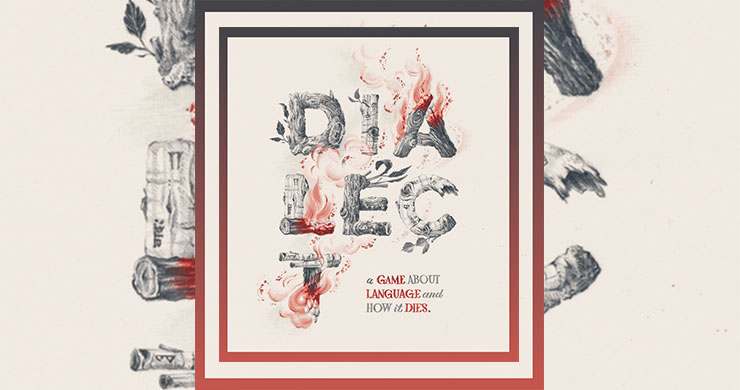Jason Frey
This past week, I played in a session of Dialect with Liese and Ben. The premise of this TTRPG is that of a language isolate that is created, maintained, and then eventually lost to time. This language is spoken exclusively by the members of an insular community called The Isolation who are separate from society at large. For this reason, the game uses the Belonging Outside Belonging framework, which has no Game Master, no dice, and is entirely reliant upon group communication, dynamics, and the building of an esoteric language.
This TTRPG is not made for a long, campaign style of play. It has three distinct rounds that map out the arc of the language, with the first round being the early creation and usage of the dialect in its “prime,” the second round being the start of the decline of the language isolate, and the third round being the future of the dialect and the death of the Isolation. To have a TTRPG with this much structure means that it can be played thoroughly in three to four sessions of a couple hours each, which is enjoyable. Additionally, the fact that the entire game is focused around creating new words that relate to the world that the players build together facilitates deeper immersion than would typically happen from such a short game. Creating and using words that do not have a place anywhere outside of the game forms these associations in the players’ minds about the physical and temporal placement of the story and completely separates the world within the “magic circle” of the game from the outside world, since they would never speak the dialect anywhere but within the game.
The sense of structure that the set rounds of play provide also extends to character creation. The guidebook presents a few sample stories to follow so that the players understand what group they are a part of and where in society (or out of society) they fit. Our particular group chose the Thieves’ Cant backdrop, which sets the premise of a group of thieves, criminals, or other shady characters speaking in code to carry out their dastardly plans. The manual guides the players through answering questions about the tenets of the group, the integral memories and motivations for our work and lives, and where/when they are located. Our Isolation was named Le Fantome, a group of assassins living in 1800s France that seeks to influence city politics and wealth by strategically assassinating, or alternatively protecting, certain prominent figures throughout Paris. To choose our characters’ positions and roles, we drew from the deck of cards. For example, I drew The Ruler, which guided both my character creation and first created word, which was sinethil. Dialect forces the players to consider their position, goals, and fears to create words that speak to their lived experiences within the Isolation. In creating sinethil (which is a combination of “sin” and “ethics,” representing the “work of careful and precise assassination”), I was speaking to my preoccupation with carrying out the missions of Le Fantome and keeping the group together, focused around a single task.
I enjoyed many things about this game, including how each word created must be formed in conversation with the other players as a community advocating for a diverse set of interests. It is clever to have the players “connect” each created word to a core tenet of the Isolation that is placed physically on the table top. However, even though this game can be played in a few sessions, and should be fairly quick in the grand scheme of things, I don’t know that it can be particularly satisfying if it is not built up over a longer period of time. This is to say that the game felt like it made the most sense when there seemed to be a consistent linguistic thread throughout the created words, but this is very hard to do without a lot of preparation and linguistic expertise. There was so much structure in every other aspect of the game, but when it came to the actual word creation, I felt a little lost because the game gives some general guidance in the appendices, but very minimal starting places for word creation. I understand that this is to provide flexibility, but some starter “stem” cards would have been nice for Round 1, and it would have been an enjoyable twist to have the game consider writing-based (e.g. rebuses) instead of speech-based language isolates. Overall, I would recommend giving this game a try if you are into linguistics, improvising short vignettes, and crafting personal goals around a secret society’s mission.
